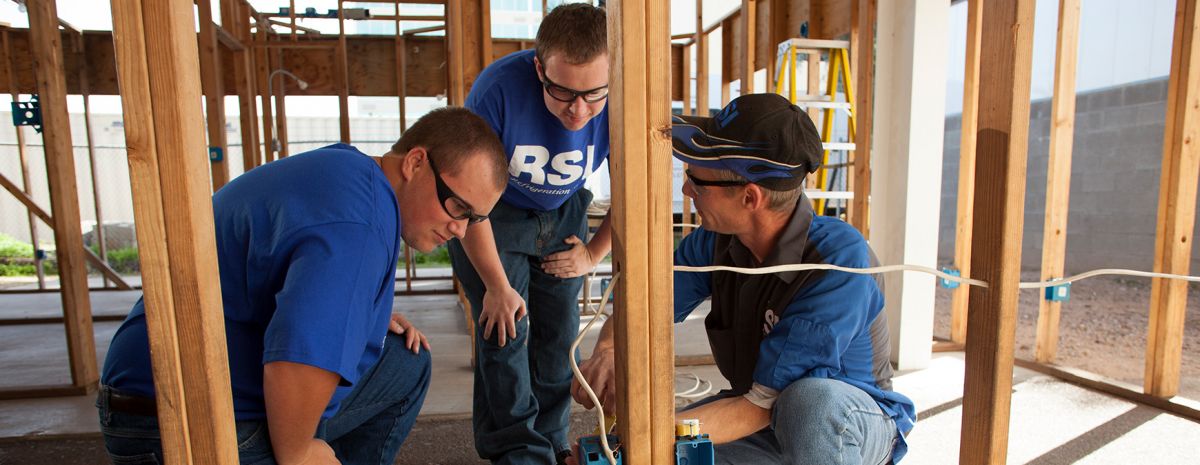RSI is a Great Training Option for Everyone
Learn more about how we can prepare you to advance your career.
Skilled trades are an essential part of a fully functioning economy.
But there’s still a lot of confusion surrounding the trades and the important role they play in society.
If you’re looking for an alternative to the standard four-year college degree, a job in the skilled trades might be calling your name.
What is the meaning of skilled trade?
Skilled trades are specific jobs that require highly specialized skills, abilities, and expertise.
These occupations typically involve physically demanding, hands-on work that sets them apart from traditional desk-based jobs.
Get Started on the Path to a New Career
Fill out our form to learn how we can help you change your life.
The skilled trades offer a rewarding academic and professional path for individuals looking for an alternative to a four-year degree.
What are some skilled trade jobs?
Skilled trade jobs aren’t limited to an individual sector of the economy.
Instead, these professions are spread across dozens and dozens of crucial areas:
- Manufacturing
- Energy
- Technology
- More
While it’s impossible to cover all skilled trades in-depth, we’ll highlight a few skilled trades jobs that are important to the country.
HVAC
HVAC technicians are responsible for installing, servicing, and repairing heating, cooling, and refrigeration systems in a wide variety of settings:
- Residential
- Commercial
- Industrial
It’s common for HVAC techs to specialize in a certain subfield of the skilled trade to increase their value to clients and their earning potential.
Electrician
Electricians are tasked with installing, servicing, and fixing electrical power systems in a range of residential, commercial, and industrial environments.
It’s normal for electricians to work alone when completing their job responsibilities, but it’s sometimes necessary for these professionals to collaborate with other skilled trade experts on large, complex projects.
Welding
Another common and in-demand skilled trade profession is welding. These experts use welding torches and specialized equipment to manipulate metal products to achieve specific goals.
Welders need to become well-versed in different welding techniques to choose the most effective method depending on the demands of the project.
What trade skills are in demand?
The skilled trades have been suffering from a labor shortage for the past few years as older tradespeople retire and demand grows. Let’s look at the employment demand predictions for the three skilled trades we just introduced.
HVAC
Due to the HVAC labor shortage, the demand is expected to rise 5% annually through 2030. The construction of homes and businesses will be a major driving force behind this growth. On top of that, the advancement of sophisticated HVAC systems is expected to lead to a greater need for highly specialized HVAC techs.*
Electrician
Electricians can expect to see a healthy annual growth in demand at 7%. This translates into 79,900 new job openings in the electrical field each year. The retirement of current electricians and the growing focus on alternative power generation are driving this increasing demand.**
Welding
The welding is expected to see a growth of 8% each year until 2030. This represents 47,600 job openings for welders. These professionals are needed to repair and replace the country’s deteriorating infrastructure such as buildings, highways, and bridges.***
How do you get started in the skilled trades?
The skilled trades have a lower barrier of entry when compared to more traditional roles that require a four-year degree.
To get started on the path towards a skilled trade, all you need is a high school diploma or GED equivalent.
After that, there are essentially two viable paths toward a rewarding and successful career in the skilled trades: apprenticeships and technical programs.
Apprenticeships
Through an apprenticeship, students work directly under an experienced specialist in their desired field to learn the ropes of the trade. The value of an apprenticeship is entirely dependent upon the ability and knowledge of the teacher.
Trade Schools
Individuals looking for a more holistic and flexible route towards a skilled trade career can take a trade school program.
These programs, typically hosted by educational organizations, give students hands-on, practical experience supplemented by relevant material to further their skills and knowledge in a particular field. Trade schools allow participants to fully specialize in a specific skilled trade to graduate with the abilities and expertise needed to succeed.
If you’re interested in pursuing a career in the skilled trades, take a look at some tips for planning long-term success in this line of work.
* According to BLS data Arizona employed 7,950 Heating, Air Conditioning, and Refrigeration Mechanics and Installers (499021) through May 2021 http://data.bls.gov/oes.
**According to BLS data Arizona employed 14,450 Electricians (47-2111) through May 2021 http://data.bls.gov/oes.
***According to BLS data Arizona employed 5,810 Welders (51-4121) through May 2021 http://data.bls.gov/oes.
Additional Sources
This blog has been labeled as archived as it may no longer contain the most up-to-date data. For a list of all current blog posts, please visit our blog homepage at https://www.rsi.edu/blog/




